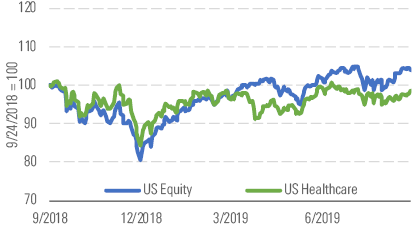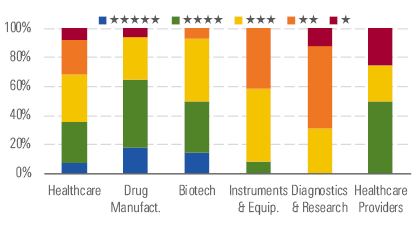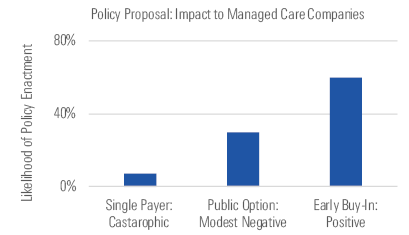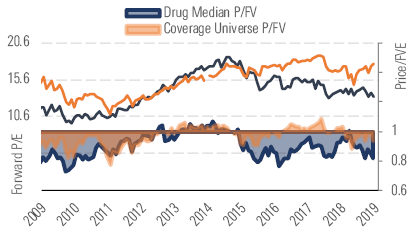Healthcare: Political Uncertainties Have Weighed on the Sector
We see opportunities in providers, managed care, drugs, and biotech.
Morningstar's U.S. Healthcare Index slipped 2% quarter to date as of Sept. 24 amid market concern around healthcare pricing pressures (Exhibit 1), underperforming the broader equity market performance of 1%. Also, as potential changes in U.S. healthcare policies have become more elevated with politicians increasing rhetoric for the upcoming presidential election, increased uncertainty has weighed on the sector's relative performance.

Healthcare Sector Index vs Market Index. - source: Morningstar
Overall, we view the healthcare sector as slightly undervalued. Our coverage trades at a minor discount to our overall estimate of intrinsic value, with the median price/fair value at 0.96. Nevertheless, we see a fair number of buying opportunities, with 35% of our coverage carrying a 4- or 5-star rating (Exhibit 2).

Star rating distribution and average P/FV for sector and key industry groups. - source: Morningstar
We see the most opportunities in the healthcare provider, managed-care organization, drug, and biotech industries. In the healthcare provider industry, we view the market as overly concerned about potential regulatory changes to pricing, especially in the dialysis industry, where we expect pricing to hold up and drive increased valuations for the leading companies.
In the managed-care industry, we believe valuations are pressured by concerns about potential U.S. healthcare policy changes. However, we view the potential for “Medicare for All” (or universal healthcare coverage) in the U.S. as very unlikely because of the high cost of the plans and challenging complexity in implementation. Other potential policy changes have much less impact on managed-care companies (Exhibit 3).

Assessment of potential policy choices and outcomes for managed care. - source: Morningstar
Turning to the drug and biotech space, U.S. politicians have continued to focus on new policies limiting drug pricing power, creating pressure on valuations in the industry. However, we believe the focus of drug development is in areas of unmet medical need, which tends to support strong pricing even within the context of the new policies aimed at restricting drug pricing.
We base all our valuations on a discounted cash flow analysis, but looking at a P/E trend (Exhibit 4), the drug/biotech stocks look more expensive than the bargain basement prices of 2010 but less expensive than 2014 (before pricing pressures became more of a concern).

Big Pharma/biotech valuation versus the P/E multiple over the past 10 years. - source: Morningstar
Top Picks
AbbVie ABBV Economic Moat: Narrow Fair Value Estimate: $102 Fair Value Uncertainty: Medium The market is underappreciating AbbVie's next-generation drugs, overly concerned about the United States' loss of exclusivity for immunology drug Humira in 2023, and anxious about the leverage taken on for the Allergan acquisition. While we agree that these are all concerns, we believe the current valuation is overly weighed down by these issues. We expect the new immunology drugs launching from AbbVie's portfolio will post strong trajectories, alleviating some of the concerns facing the company. Additionally, we expect AbbVie will quickly repay debt taken on to finance the Allergan acquisition.
Biomarin Pharmaceutical BMRN Economic Moat: Narrow Fair Value Estimate: $119 Fair Value Uncertainty: Medium BioMarin's orphan drug portfolio and strong late-stage pipeline support a narrow moat, and we think the market underappreciates the firm's entrenchment in current markets as well as its potential in new markets, particularly with its emerging gene therapy pipeline. BioMarin has several products on the market to treat rare genetic diseases; these products generally see strong pricing and have limited competition because of a solid combination of patent protection, complex manufacturing, and BioMarin's close relationships with patients who rely on its therapies for chronic treatment.
CVS Health CVS Economic Moat: Narrow Fair Value Estimate: $92 Fair Value Uncertainty: Medium CVS' ownership of the largest national pharmacy benefit manager provides it substantial negotiating leverage and cost advantages in claims processing, allowing for best-in-class operating costs per claim. Further, the firm's combination with Aetna should put the company in a much more attractive competitive position as the industry moves toward preferring a more integrated service offering. Lastly, investors should benefit from meaningful cost and selling synergies associated with the combination of a leading medical benefits business with the largest PBM and retail pharmacy network in the country.
MORN DODFX VINIX VWILX TSVA EGO WU Brightstart429plan MRO VZ MOAT T NKE CMCSA GOOG

/s3.amazonaws.com/arc-authors/morningstar/a90c659a-a3c5-4ebe-9278-1eabaddc376f.jpg)
/cloudfront-us-east-1.images.arcpublishing.com/morningstar/JNGGL2QVKFA43PRVR44O6RYGEM.png)
/cloudfront-us-east-1.images.arcpublishing.com/morningstar/BC7NL2STP5HBHOC7VRD3P64GTU.png)
:quality(80)/s3.amazonaws.com/arc-authors/morningstar/a90c659a-a3c5-4ebe-9278-1eabaddc376f.jpg)